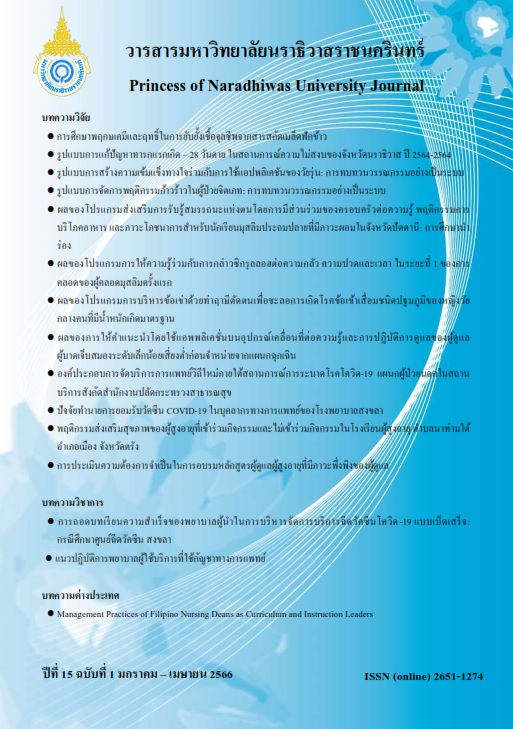Management Practices of Filipino Nursing Deansas Curriculum and Instruction Leaders
Keywords:
nursing, dean, educational management, curriculum, instructionAbstract
Academic operation of nursing program is challenging. The deans who served as a program administrator were once working as nurses in the clinical setting or faculty members of nursing schools. Deans are expected to manage the nursing program and produce graduate nurses ready to practice the profession. This qualitative study which involved 19 participants was done to identify the common management practices and competencies of the deans as described by themselves, students, faculty members, and immediate supervisor utilizing a multicase study design. Curriculum and Instructional Leadership domain covered the common management practices of the functions and responsibilities of deans as stipulated by the Commission on Higher Education (CHED) Memorandum Order Number 15 series 2017. The results show that the dean as an instructional leader was engaged in curriculum and instructional development and evaluation with the involvement of faculty members and stakeholders. The deans were advancing change and innovation of instruction and assessment and promoting the use of digital resources.
References
Axtell, S. A., Avery, M., & Westra, B. (2010). Incorporating cultural competence content into graduate nursing curricula through community-university collaboration. Journal of Transcultural Nursing, 21(2), 183–191.
Belita, E. Carter,N., & Lukosius, D. (2020). Stakeholder engagement in nursing curriculum development and renewal initiatives: a review of the literature. Quality Advancement in Nursing Education – Avancees en formation infirmiere Vol. 6.
Bitterova, M., Haskova, A., & Pisonova, M. (2014). School leader’s competencies in management area. Procedia Social and Behavior Sciences Vol. 149.
Bouws, M., Candela, L., & Bonnema, J. (2016). The novice nursing dean: A qualitative study of the lived experience. Journal or Nursing Education and Practice. 6(8).
Cerna, L. (2014). “Innovation, governance and reform in education”, CERI Conference. www.oecd.org/edu/ceri/CERI%20Conference%20Background%20Paper_formatted.pdf.
CHED Memorandum Order No. 15 (2017). Policies, standards, and guidelines of Bachelor of science in nursing. Retrieved from http://api.ched.ph/api/v1/download/4268
Chiang, C., Chapman, H., & Elder, R. (2011). Overcoming challenges to collaboration: Nurse educators' experiences in curriculum change. Journal of Nursing Education, 50(1), 27– 33.
Creswell, J.W. (2009). Research design qualitative, quantitative, and mixed methods approaches. (3rd ed.). Sage Publications, Inc.
Dalrymple, S. E., Auerbach, A. J., & Schussler, E. E. (2017). Taking a community approach to curriculum change. International Journal for the Scholarship of Teaching and Learning, 11(2).
D'Antonio, P. O., Walsh Brennan, A. M., & Curley, M. A. Q. (2013). Judgment, inquiry, engagement, voice: Re-envisioning an undergraduate nursing curriculum using a shared decision-making model. Journal of Professional Nursing, 29(6), 407–413.
Henk, W., Wepner, S. Lovell, S., & Melnick, S. (2017). Education deans’ beliefs about essential ways of thinking, being, and acting: A national survey. Journal of Higher Education Management. 32(1).
Llomaki, L., & Lakkala, M. (2018). Digital technology and practices for school improvement: innovative digital school model. Research and Practice in Teaching and Enhanced Learning 13(25).
Ngowi, A., & Jager, H. (2016). A competency-based approach to recruiting and developing academic leaders review. Retrieved from https://www.semanticscholar.org/paper/A-Competency-Based-Approach-toRecruiting-and-%E2%80%93-A-Ngowi-Jager/ca9042d3a22 abfe105f85829 48ed2e9d5a81fd2a
Nosek, C. M., Scheckel, M. M., Waterbury, T., MacDonald, A., & Wozney, N. (2017). The collaborative improvement model: An interpretive study of revising a curriculum. Journal of Professional Nursing, 33(1), 38–50.
Patterson, B., & Krouse, A. (2015). Competencies for leaders in nursing education. Nursing Education Perspective, 36 (2), 76 – 82.
Stabback, P. (2016). What makes a quality curriculum? IBE UNESCO International Bureau of Education.
Tolarba, J. (2016). Nursing education in the global age. Proceedings of the 1st International Conference on Nursing Eucation . Manila, Philippines
Downloads
Published
How to Cite
Issue
Section
License
Copyright (c) 2023 Princess of Naradhiwas University Journal

This work is licensed under a Creative Commons Attribution-NonCommercial-NoDerivatives 4.0 International License.




